INTERVIEW: FIRE & DUST MEETS SUJANA CRAWFORD
Here she is. Bobbling pigtails,
chubby fists, a chariot of drunken legs.
And here he is. A new crown of soft quills
gauging the kilter of his reign,
silky grass curtsying as he leads the way.
Now she’s down on scuffed knees
in her dress grass-stained,
following him
into the undergrowth.
A forgotten, forgiving wonderland – a blessing really.
Ivy brambling with two-toned silver queen,
blackbirds mastering hopscotch,
a slumber party of slugs.
She holds out the runway of her arm, to grant
a woodlouse safe passage. What are our little ones
if not a balancing act, trying to make their way
across earth’s undivided playing field?
Later, she will eat spaghetti from a purple plate,
then be read to until her eyes grow heavy.
And he will suckle his mother before
setting out again to forage into the night.
But for now, she offers him a fistful
of dandelions, their bright yellow ligules
like sunlight filtering through woodland,
where he has feasted since it all began.
______________________________-‘Hoglets in Warwickshire’
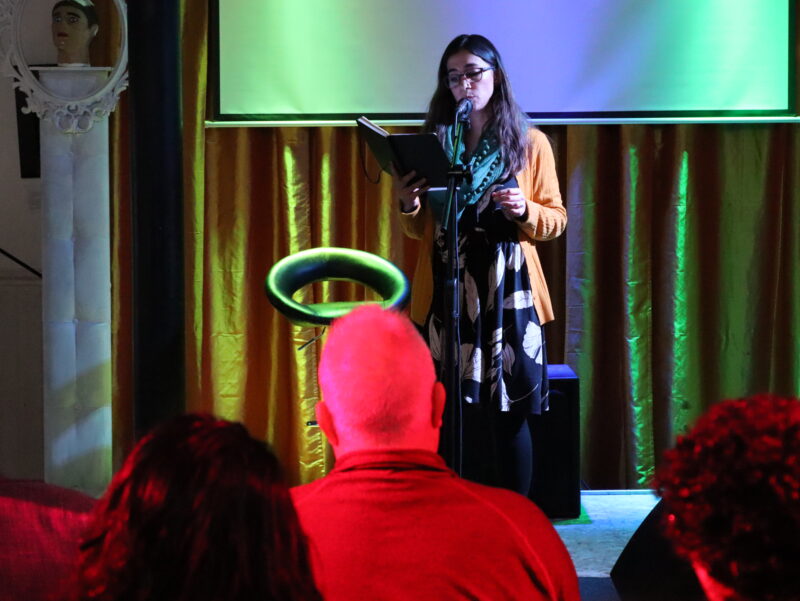
Photography credit: Tracy Morris
Sujana Crawford is a multilingual poet, playwright, and researcher, fluent in English, Nepali, and Hindi. By day, she works as a UX Researcher. Her work has been featured in magazines, anthologies, and on BBC Radio 3’s The Verb, as well as at the BBC Contains Strong Language Festival and the British Council’s International Changemakers. She has also developed plays with BBC Radio 4, Birmingham Rep, and Warwick Arts Centre. In 2022, Sujana represented Coventry in a poet exchange with Cork, Ireland. Born in China, raised in Nepal, and now based in Yorkshire after nearly a decade in the Midlands, her creative work explores people, places, and folklore.
Sujana was our Fire&Dust headliner at The LTB in July 2024, where her poetry set was well-received by the crowd. We caught up with her after the gig, to ask a few questions…
HCE: Tell us a little about your journey as a writer so far. What inspired you to start creating and performing poetry?
SC: I grew up surrounded by books as both my parents were avid readers, and reading was a big part of my life from the start (and it continues to be). As were stories – Nepal has a rich tradition of oral storytelling and folklore. I remember many evenings spent listening to stories as told my older cousins, uncles and aunties. Katha bhannu na (please tell me a story) was a request I made frequently (in hindsight, this must have been very annoying to my folks. No wonder they encouraged me to read for myself!). These left a deep impression, and some of these stories I still retell to my children today. Writing was perhaps a natural progression from this. I don’t really remember a time when I wasn’t jotting things down – whether it was little poems, short stories, or just thoughts. For a long time, writing was a very private thing. A way to process and make sense of the world around me. Some of my earlier poems are rather angry, for example, and looking back, I can see it was my way of unpicking and analysing some of the patriarchal nonsense I was beginning to recognise. I wrote for myself and didn’t feel the need to share my writing with anyone, let alone an audience.
In my twenties, I started sharing my poetry occasionally. I joined a writer’s group my father was a part of, and a few times him and I read together. I found I really enjoyed connecting with people through my words and hearing how my writing resonated. However, I spent a lot of my twenties travelling and living and working in different places, and while I continued to write when I felt like it, I hardly ever gave any thoughts to craft or theme. My tendency to uproot myself every so often didn’t also allow me to feel a sense of community anywhere. It wasn’t until my thirties, when I found myself more grounded (and perhaps also rather lonely) with my kids and family, that writing became more than just something I did for myself. It became a lifeline, a way to connect, to express, and to find community. By this point, I also had plenty to say!
Over the years, as I’ve read more, met and befriended fellow writers and written and shared my work in a more deliberate manner, I’ve come to realise how much I love being part of a wider writing community. It’s the people, the shared experiences, and that mutual support that keep me inspired and excited to keep writing and performing.
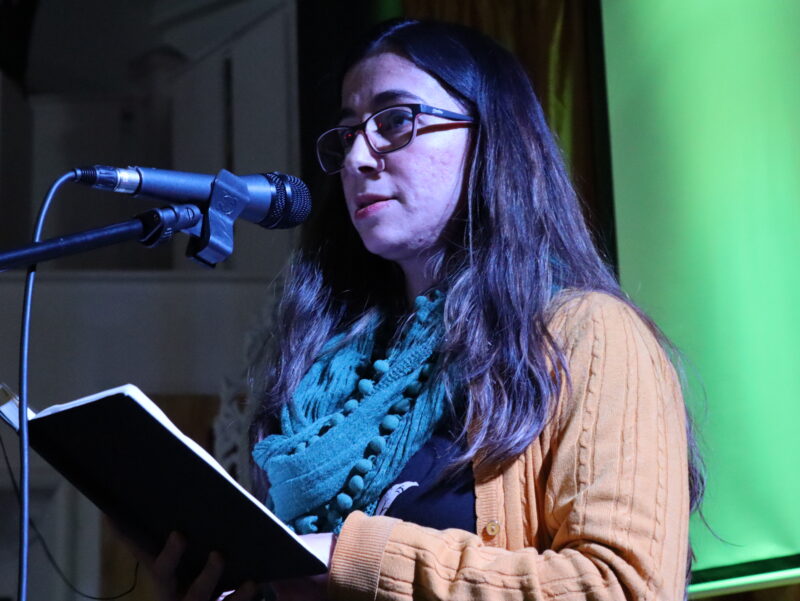
Photography credit: Tracy Morris
HCE: Who is your work aimed at – do you have an ideal audience in mind when you’re putting a poem together?
SC: Honestly, unless I’m writing for a specific commission – which doesn’t happen all that often – I usually write for myself. I know that might sound a bit self-indulgent, but for me, writing is still a very personal process. I’m not somebody who has a set routine or specific audience in mind; I’m pretty inconsistent with my writing. I go through phases, writing when inspiration strikes and switching between genres, so it feels more organic than planned. Writing is also something I fit around the rest of my life, which involves young children, a day job and so on.
When I’m working on a poem, it’s like I’m building this personal connection with the piece itself. It’s a process that’s mostly about exploring an idea or feeling that’s resonating with me in that moment. Then, when I finally reach a point where I feel the poem is more or less, only then do I consider how it might come across to others.
If I’m preparing a set for a reading, that’s when I’ll start thinking about the audience – who’s likely to be there, what themes might resonate with them. But when I’m initially creating, it’s just me and the poem. I think that’s part of what keeps my writing honest and true to where I am in that moment.
HCE: At Fire&Dust, you mentioned the theme of ‘family’ cropping up in your work more than expected. Are there other themes or motifs that you tend to gravitate to in your work?
SC: Yes, family has definitely started to show up in my work more than I’d anticipated! But because I’m such an impulsive writer, writing when inspiration strikes, a lot of the topics I return to surprise me.
I think my writing process is less about me steering the poem and more about letting the poem take me where it wants to go. So when I look back at my work as a whole, I sometimes notice these themes and patterns that I hadn’t intended, which I suppose is part of the joy and discovery of it all. Having said that, people, places, and nature are some of the recurring themes.
HCE: Elements of the natural world – plant life, animals, water sources, etc. – seem to play a significant role in your writing. Do you need to physically connect with nature for inspiration, and is this difficult to achieve when living in cities?
SC: Another great question. Yes, the natural world shows up a lot in my work, and I think that’s because it’s what I feel most connected to. Growing up in Nepal, I was surrounded by mountains, rivers, and hills. During my school days, I also spent quite a lot of my winter holidays with my aunt and cousins in the countryside. There I felt a lot closer to nature than I did in Kathmandu, where I lived with my family. That connection to nature made me feel grounded, safe, and happy, and those early experiences really shaped how I connect to world.
As an adult too, I have had the privilege of living and working in some pretty isolated and spectacular places across India, Sri Lanka and Scotland to name a few, and these too have played a significant role in shaping me. A sense of place is important to me, which is probably why it appears so much in my writing.
In the UK, as much as we might complain about the rain, it really helps keep things green and lush. In all my time here, I have always been able to find a way to connect to nature. Plus, I believe cities are a part of nature too in their own way, aren’t they?
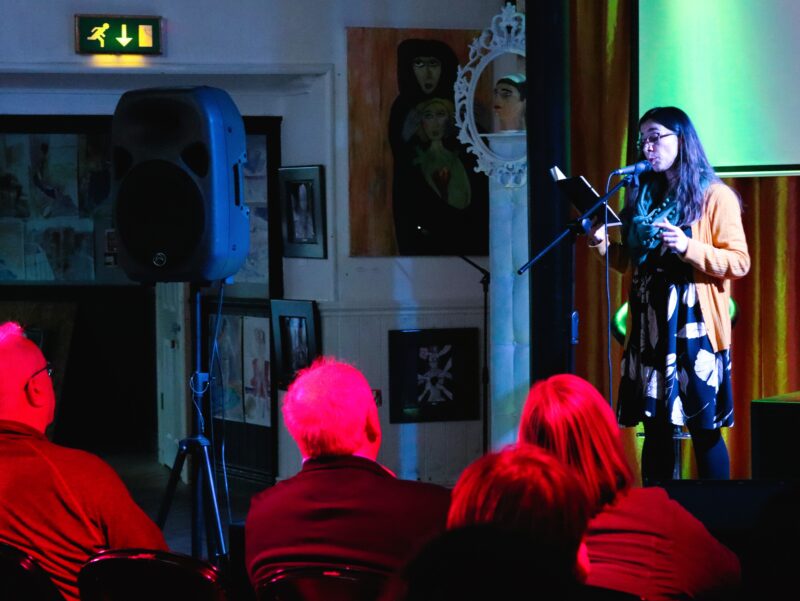
Photography credit: Tracy Morris
HCE: What is it about drama and scripts that attract you as a writer?
SC: I think it’s as simple as the fact that I love conversation. I love having them, I enjoy eavesdropping on people on buses and cafes. I just love listening to people talk – the different ways we express ourselves, the unique phrases we use, and especially the things we don’t way! I’m always listening for those layers in conversations. There’s so much that can be conveyed in how people talk, sometimes more than in the words themselves.
When I’m writing dialogue, I get to dive into those interactions and create a story through what my characters say to each other. It feels like going on a journey with them, watching the story unfold through their conversations. That’s what I love about it – following where the characters take me and discovering the story in the way they speak and connect. Changing just a few lines can change the whole storyline, and I enjoy playing with that.
HCE: How do you decide whether poetry or a script will be the better writing medium to explore and communicate your ideas?
SC: This is something I hope to be more intentional about but at the moment, I don’t usually decide upfront if an idea will work better as a poem or a script – I just dive in and see where it takes me. Sometimes I’ll start writing a poem, and it unexpectedly grows into a short story. Or I’ll be working on a play, and someone might suggest it would work better as a novel. Recently, a dramaturg read one of my plays and pointed out that it had a cinematic quality. It would have never crossed my mind had she not mentioned it.
I usually let the idea come to me and let it find its own shape as I write. I have gotten better at editing and redrafting over the years, and that helps as well, but I think I could do with being more intentional from the start. Maybe this is why I have a lot of unfinished pieces lying around, it could be that they haven’t worked out because I’ve been trying to shoehorn them into a shape that not be right for them!
HCE: Many international writers who write in English say they love the language but have stumbled upon words, phrases or idioms from their mother tongues that are beyond translation, as no equivalent exists in English. Does Nepali or Hindi have many of these, and what are your favourite examples?
SC: Oh, yes, they are quite a lot. For instance, I was recently trying to explain the concepts of reincarnation and karma to my neighbor, and found myself struggling to find the right words that really conveyed the subtle and deeper meanings. It really highlighted how certain ideas can be so tied to their original language.
In a lot of my poems I will use the odd Nepali or Hindi words. It is not always because I can’t think of an English translation but more that the translations sometimes don’t have the same poetics or the same beauty appropriate for what I am trying to convey. In those cases, I find it’s just better to use the word that does because that’s what language is.
In the stanza below, duvet or blanket would be a very poor replacement for odhane (thick cotton blankets widely used in Nepal) is so much.
My hands no longer reach for the
prayer wheels, they ignore the butter lamps.
Through an open window, I spy a woman
steady the day ahead,
her family, like the morning sun,
still warm under thick cotton odhane.
HCE: What type of poetry do you seek out for personal enjoyment? As a reader/listener, when you engage with a poet’s work, what are you hoping to get out of it?
SC: I’m drawn to poems that take me on an emotional journey. I like poems that reveal themselves in a way that’s clear and heartfelt, rather than cryptic or overly dense. To me, any form of literature is a way of sharing our stories – a means of better understanding each other’s experiences. It might sound simple, but that’s what I look for.
Recently, I read Bright Fear by Mary Jean Chan. In this collection, there are several short poems with such precise, striking observations that I know I’ll return to them again and again. Other poets who inspire me include Sean Hewitt, Hannah Lowe, and Jacqueline Saphra. Saphra’s All My Mad Mothers is one of my all-time favourite collections.
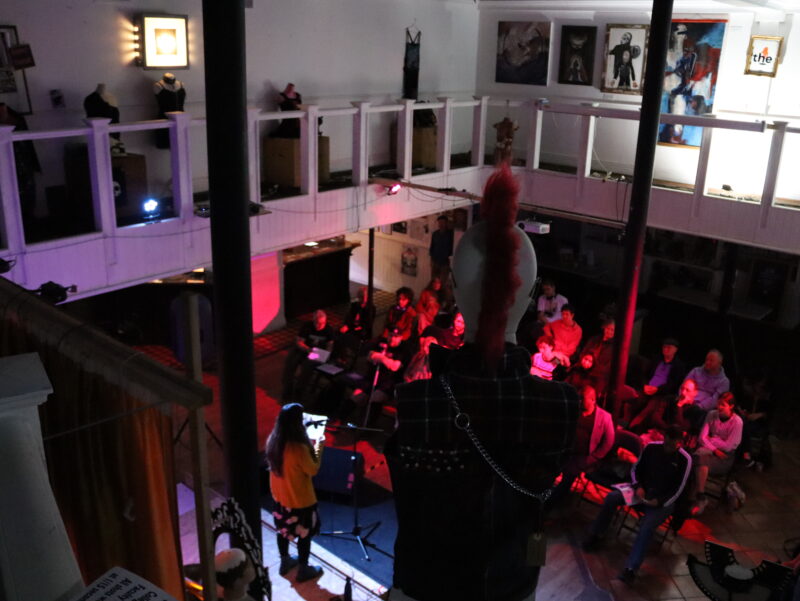
Photography credit: Tracy Morris
HCE: Does Yorkshire seem like a good place to be a poet/writer so far? How does it compare to living in Warwickshire – have you noticed any key differences between the poetry scenes in these regions?
SC: I’ve been in Yorkshire for a year now, and although I haven’t had the chance to explore or participate as much as I’d like, I’ve loved everything I’ve been able to experience so far. I live near a cozy spot called Hyde Park Book Corner, where I had the chance to see Selena Godden perform earlier this year – a real highlight. The venue actually reminds me of Fire and Dust at FarGo, where you used to host events. Honestly, I haven’t noticed much of a difference – us “poetry types,” as people say, seem to have a lot in common everywhere.
Now that my family and I are feeling more settled, I’m looking forward to diving more deeply into the local literary scene in the new year. With Bradford as the next City of Culture, I’m excited to attend events there and get to know the creative community better.
HCE: How do you think arts communities could do more to support poets who are juggling family and childcare responsibilities alongside their writing, to make sure their voices are platformed and heard?
SC: This is a tricky one. Even after more than ten years as a parent, I’m not sure I have an answer. The irony is, if it weren’t for my kids, I don’t think I’d have ever slowed down enough to properly give writing a go. But balancing it all – family, work, and creativity – has been a real challenge.
I’m currently on a writer development programme with Box of Tricks, a Manchester-based theatre that supports writers over 35 with work and family commitments. It’s been a fantastic experience and has helped me feel more at home in this part of the country. That said, I did miss a few sessions due to childcare plans falling through. One thing I find encouraging is seeing more writers starting their careers later in life, and the creative and publishing worlds beginning to take notice. Things still lean towards the younger crowd, but there’s a definite shift happening.
I think programmes like these make a real difference. After all, no one’s experience or creative voice is more or less important than anyone else’s. This belief was one of the driving forces behind Writing the Journey, a programme I co-designed with Maokwo and the Warwick Arts Centre. We created an experimental, collaborative piece of theatre, which the audience really connected with, but the process wasn’t easy! We learned a lot along the way, yet I still don’t know if there’s a simple answer to balancing it all.
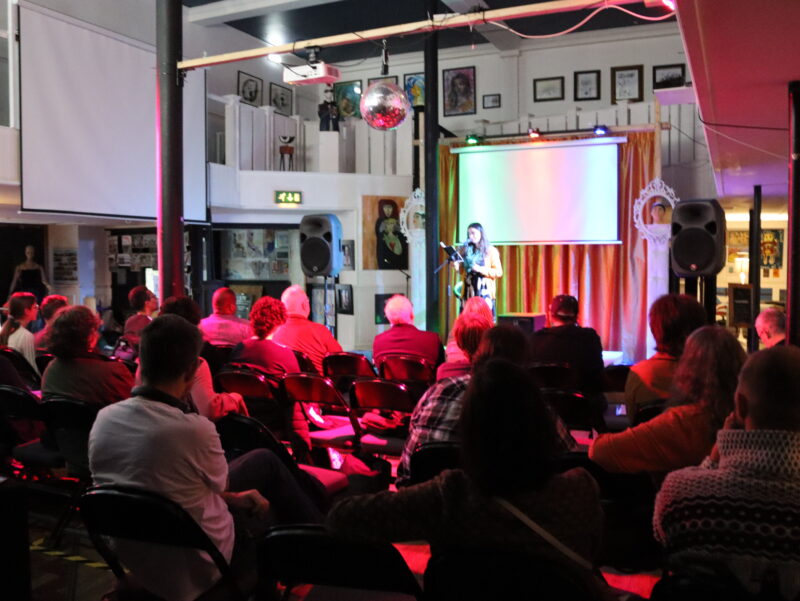
Photography credit: Tracy Morris
HCE: What’s next on the horizon for you? Are you already working on a new project/booked for upcoming performances?
SC: I’m working on a couple of projects at the moment. A few years ago, a residency with Theatre Absolute offered me time and space to start an early draft of a play exploring grief, parenting and more. After a few years away from it, I’m back working on it again and find myself fully immersed. An extract of the play will be read in Manchester in January, and I’m genuinely excited (and a bit nervous!) to see how it comes across to an audience.
I’ve also just finished a poetry pamphlet, and I’m hoping to find the right place to bring it out into the world soon.
HCE: What’s the best way for people to keep connected with you and your work, or contact you for bookings?
Email and Twitter are the best places to reach me.
Twitter
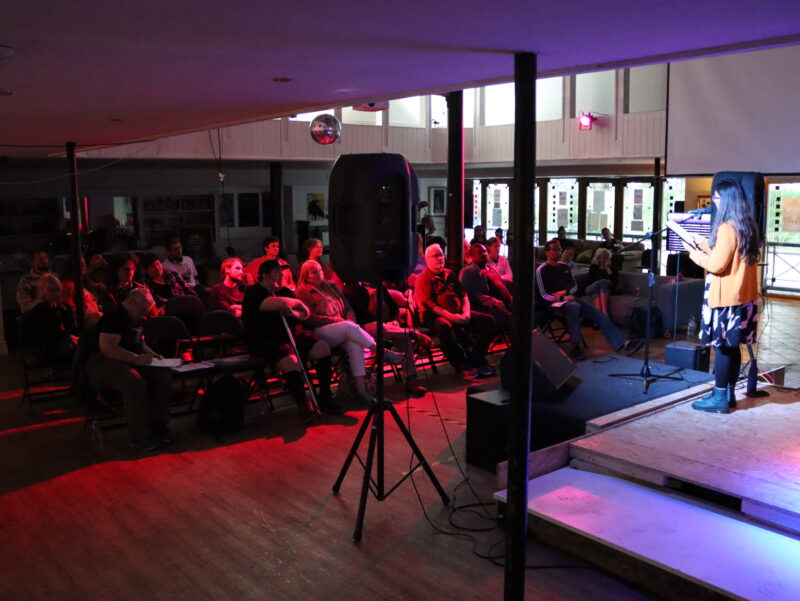
Photography credit: Tracy Morris
HCE: Is there anything we didn’t cover that you’d like to share with our readers?
SC: Fire & Dust was such an important part of my journey when I first began reading my work in public more seriously. I remember often rushing in late, just after putting the kids to bed, but feeling instantly welcomed. Coming back in July to read a longer set was a real joy, and I just wanted to say how grateful I am for everything for Fire & Dust and HCE’s team do for poets across the Midlands and beyond!
